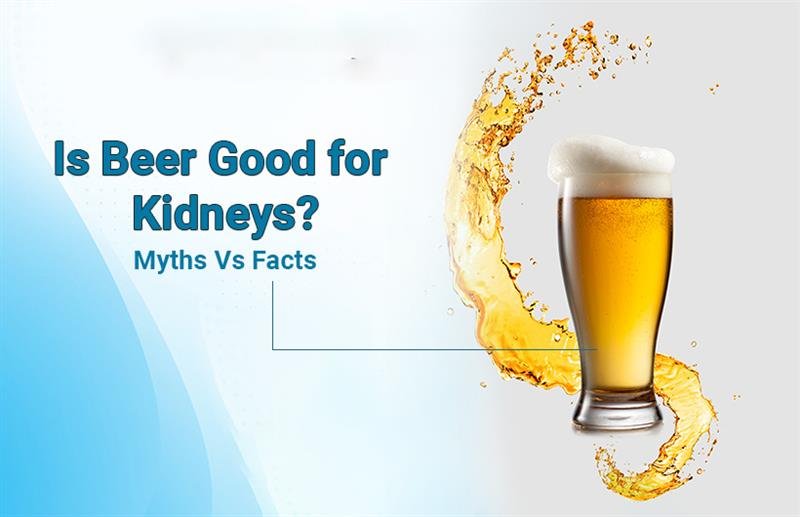When it comes to kidney health, there are many myths floating around, one of the most popular being that drinking beer can help flush out kidney stones. While this belief has been passed down for years, it’s important to separate facts from misconceptions. Let’s take a closer look at what science and medical experts, including Dr. Ravi Bhadania, a leading kidney specialist in Ahmedabad, say about beer, kidney stones, and overall kidney health.
Does Beer Really Help in Passing Kidney Stones?
Many people believe that beer helps with kidney stone removal because it makes you urinate more frequently. While it’s true that beer has a diuretic effect, meaning it increases urine output, this doesn’t automatically make it beneficial for your kidneys. In fact, drinking beer to treat or prevent kidney stones can sometimes do more harm than good.
Here’s why this belief is misleading:
- Temporary relief, not treatment: Beer can make you urinate more, but it doesn’t dissolve kidney stones or prevent their formation. The increased urination may only provide temporary relief by flushing out very small stones, but it’s not a reliable or safe treatment.
- Alcohol affects hydration: Alcohol causes dehydration. When your body loses more fluids than it takes in, your urine becomes more concentrated. Concentrated urine contains higher levels of minerals like calcium and oxalate, which can lead to kidney stone formation.
- Strain on the kidneys: Your kidneys must work harder to filter alcohol from your blood. Over time, excessive alcohol consumption can damage kidney function and reduce the organ’s ability to remove toxins from your body effectively.
Dr. Ravi Bhadania explains that relying on beer or any form of alcohol as a “home remedy” for kidney stones is not a medically recommended practice. Instead, proper hydration with water and following a doctor-approved diet are the safest and most effective ways to prevent kidney stones.
What Does Science Say About Beer and Kidney Health?
To understand the truth, we need to look at what research says. Some older studies suggested that moderate beer consumption might reduce the risk of kidney stones due to its water content and diuretic properties. However, recent medical evidence has debunked this idea by highlighting the negative effects of alcohol on the kidneys.
Here are a few scientific facts to consider:
- Beer is not the same as water: While beer is made mostly of water, the alcohol in it counteracts the hydrating effect. Alcohol increases urine output but also promotes fluid loss from the body, leading to dehydration.
- Alcohol interferes with kidney function: The kidneys regulate your body’s water, electrolyte, and acid-base balance. Alcohol disrupts these functions, making it harder for your body to maintain proper hydration and mineral balance.
- Beer may increase uric acid levels: High uric acid is another factor that can contribute to kidney stones, especially uric acid stones. Beer, particularly those with high purine content, can raise uric acid levels in the blood and make kidney stones worse.
- Potential for long-term damage: Chronic alcohol consumption can cause long-term kidney damage, high blood pressure, and liver issues, all of which indirectly harm kidney health.
According to Dr. Ravi Bhadania, patients with kidney stones or kidney disease should avoid using beer as a remedy. Instead, they should focus on increasing water intake, maintaining a balanced diet, and following medical advice for proper stone management.
What are the Safe Ways to Prevent and Manage Kidney Stones?
If you want to keep your kidneys healthy and avoid kidney stones, the good news is that there are simple and effective lifestyle habits you can adopt. Here’s what doctors recommend instead of beer:
1. Stay Hydrated with Water
Water is the best natural cleaner for your kidneys. Drinking enough water throughout the day dilutes the substances in urine that lead to stones. Aim for at least 8–10 glasses a day, or more if you live in a hot climate or exercise regularly.
2. Limit Salt and Animal Protein
Excess salt and high protein intake increase calcium and uric acid in urine, which can contribute to stone formation. Reducing processed foods, meats, and salty snacks can lower your risk.
3. Eat More Fruits and Vegetables
A diet rich in fruits and vegetables increases citrate levels in urine, which helps prevent stone formation. Citrus fruits like lemons and oranges are especially beneficial.
4. Avoid Excessive Caffeine and Alcohol
Both caffeine and alcohol can dehydrate your body if consumed in excess. Occasional consumption in moderation might be acceptable for healthy individuals, but those prone to kidney stones should be extra cautious.
5. Maintain a Healthy Weight
Obesity can increase the risk of developing kidney stones. Regular exercise, a balanced diet, and adequate hydration can help in maintain overall kidney health.
6. Follow Medical Advice
If you have a history of kidney stones, it’s important to identify the type of stone you have. Treatment and dietary advice vary based on whether the stone is calcium oxalate, uric acid, or another type. Your doctor might recommend specific medications or supplements to prevent recurrence.
Can Occasional Beer Consumption Be Harmful?
Moderate beer consumption (for example, one drink occasionally) may not cause significant harm to healthy individuals. However, it’s important to understand what “moderate” really means, generally that’s up to one drink a day for women and up to two drinks for men.
Even so, for people with kidney stones, high uric acid levels, or existing kidney disease, any amount of alcohol can worsen symptoms or interfere with treatment. Therefore, it’s best to avoid beer entirely if you are prone to kidney issues.
Remember, while social drinking may seem harmless, using beer as a preventive or curative measure for kidney stones is not advised. Your kidneys are delicate organs that play a vital role in filtering waste, and protecting them should always be your top priority.
Myths vs. Facts About Beer and Kidneys
| Myth | Fact |
| Beer helps dissolve kidney stones. | Beer doesn’t dissolve stones; it can dehydrate you and worsen stone formation. |
| Beer is good for kidney cleansing. | Only water and proper hydration cleanse the kidneys effectively. |
| Moderate beer drinking has no impact on kidney health. | Even moderate consumption can affect hydration and kidney function in some individuals. |
| Beer is a safe home remedy for kidney stones. | Beer is not a treatment and should never replace medical care. |
Conclusion
The idea that beer helps with kidney stone removal is a myth that needs to be put to rest. While it may temporarily increase urination, the dehydration and kidney strain caused by alcohol outweigh any potential benefits.
Dr. Ravi Bhadania advises that anyone experiencing symptoms like severe back pain, blood in urine, or difficulty urinating should seek medical attention immediately. Self-medicating with alcohol or relying on home remedies can delay proper treatment and lead to complications.
To keep your kidneys healthy, prioritise hydration, balanced nutrition, and regular check-ups. When it comes to kidney health, skip the beer and stick to water, your kidneys will thank you!


